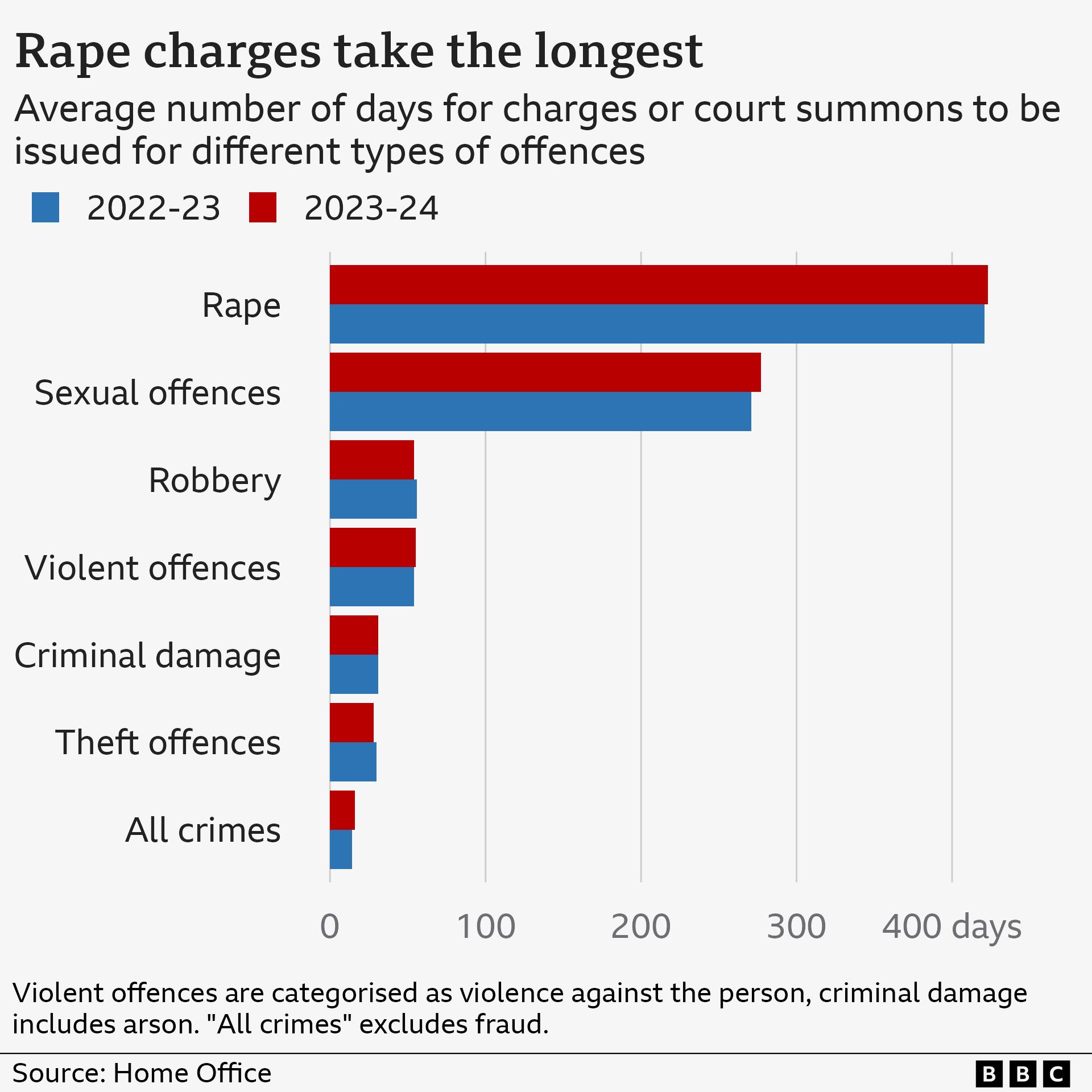
Warning: This story contains details some may find distressing. Names have been changed
After five years of waiting, Ellie was finally on the stand giving evidence against her rapist.
She had been warned that his defence team would use whatever they could against her.
But still, she felt ŌĆ£bulldozedŌĆØ when she was questioned over CCTV footage showing her standing near her rapist in a bar, adjusting her top.
ŌĆ£I had to say to a room full of strangers, a jury of my peers, ŌĆśYes I have big breasts, basically, and theyŌĆÖre heavy and sometimes I have to readjust themŌĆÖ,ŌĆØ she says.
ŌĆ£Afterwards you ruminate and you think, ŌĆśWhat were they implying, that I was trying to be provocative?ŌĆÖŌĆØ
Her experience is far from unusual. Three quarters of sexual offence victims report being asked at least one question in court based on what campaigners say are rape myths and stereotypes, .ŌĆ»These include being asked what they did to stop the assault, about drinking or taking drugs, and what they were wearing.

ŌĆśYou lured him inŌĆÖ
The defence barrister in EllieŌĆÖs case suggested the whole thing was a drunken night out that she later regretted.
ŌĆ£They sort of implied that I was drinking a lot and that maybe I forgot [what happened]ŌĆ” The narrative this man had spun was very grotesque,ŌĆØ she says.
ŌĆ£[They said] ŌĆśIsnŌĆÖt it true that you didnŌĆÖt get raped? What actually happened was you lured him in and you regretted it the next day, didnŌĆÖt you? And you couldnŌĆÖt face the shameŌĆÖ,ŌĆØ she says.
In fact, she had gone straight to bed alone after a night out, which a friend corroborated in court. She then woke up in the morning to find the man on top of her.
Her rapist, a repeat offender, was sentenced to 19 years for his attack on her and a different woman.
Despite her horrifying experience, Ellie describes herself as one of the ŌĆ£luckyŌĆØ ones. For every 100 rapes recorded by the police in England and Wales, .
One reason is that before their trial takes place. After reporting their assault to the police, victims can be left for months or even years waiting for their attacker to be charged. It then takes an average of two years for the case to get to trial, according to the Criminal Bar Association.

Many fear that, after years of waiting, their behaviour and sexual past will be torn apart to sway the jury.
We know from research into public attitudes and understanding of rape and sexual offences that this is likely to be an effective strategy.
concluded that ŌĆ£the publicŌĆÖs accurate understanding of rape is outweighed by false beliefs, misunderstanding, lack of knowledge, and underlying stereotypesŌĆØ.
Fewer than half of those surveyed could identify common rape myths and perceptions, and one in 10 agreed that it was up to women to take precautions against rape.
Half were either unsure or agreed that someone who had been drinking or taking drugs should take some responsibility if they are raped, while only a third agreed that women rarely make up rape allegations. Evidence shows that very few people fabricate allegations of rape or sexual assault.
Underpinning all this is that the nature of rape as a crime makes it particularly hard to prove, explains Kama Melly KC.
She is head of rape and serious sexual offences for the Criminal Bar Association, and has both prosecuted and defended in sexual offence cases.
ŌĆ£The vast majority of the time there's not going to be any witnesses or CCTV,ŌĆØ she says.
ŌĆ£Secondly, there's not going to be forensic evidence, because in the vast majority [of rape cases] consent is the defence.
ŌĆ£Thirdly, it's pretty rare to have injuries even through non-consensual sexual activity. So you're not going to have forensics. So you are going to have one personŌĆÖs word against anotherŌĆÖs about sexual matters which nobody finds easy to describe or talk about.
ŌĆ£And then you've got, ŌĆśwhat is rape?ŌĆÖ [In a legal context] rape isn't just sex without consent. Rape is sex without consent with the male not reasonably believing that she was consenting.ŌĆØ
When it comes to rape myths, she points out that it is the defence barristerŌĆÖs duty to represent their clientŌĆÖs best interests in court, within the bounds of their own code of conduct.
ŌĆ£Fundamentally, the issue is that our courts often reflect society. If our society still holds women slightly accountable for being really drunk and going back to a bloke's house, then should a barrister ŌĆō [who is] trying to fight as hard as they can for a man who says that they are innocent ŌĆō take some of that on board?ŌĆØ
WhatŌĆÖs more, questioning a victim about something the defendant will say in their evidence at least gives them a chance to defend themselves against it, she argues.
ŌĆ£It would be so wrong if they [the victim] were not given the opportunity to say, ŌĆśno, thatŌĆÖs absolutely not what happened.ŌĆØ
Ultimately, she suggests it is for the judge to intervene if questioning has gone too far or is irrelevant.
But what happens when a victim thinks a judge is also playing into rape myths?
ŌĆśShockingŌĆÖ remarks
Leila, who was abused by a former partner, was left ŌĆ£shockedŌĆØ by her judgeŌĆÖs remarks. This was despite the fact she sentenced LeilaŌĆÖs abuser to three years in prison after he pleaded guilty to assault by penetration and multiple charges of sexual assault.
The judge twice remarked during sentencing that LeilaŌĆ»would sleep in ŌĆ£his bedŌĆØ not wearing underwear.
ŌĆ£She said I was getting into his bed, not our bed, itŌĆÖs not as if I have the right to sleep in whatever I feel comfortable in without fear of being attacked,ŌĆØ Leila says sarcastically. ŌĆ£Obviously if I get in with no knickers, on my head be it.ŌĆØ
The judge said to the defendant that Leila had ŌĆ£reluctantly consented to having sex with youŌĆ” as part of the give and take" of a relationship, adding:ŌĆ»ŌĆ£The problem came when you started assaulting her as she slept.ŌĆØ
She also refused to grant an indefinite restraining order against LeilaŌĆÖs ex-partner, saying that ŌĆ£given her [LeilaŌĆÖs] present attitudeŌĆ” if he looked the wrong way at somebody she will be reporting it to the police.ŌĆØ
The CPS and LeilaŌĆÖs private barrister appealed the sentence as being unduly lenient.
LeilaŌĆÖs barrister argued the judge had ŌĆ£diminished the offending in a domestic setting, using myths and stereotypes and failing to provide equal treatment to [Leila] by indicating that the offences occurred because the couple were ŌĆśsexually incompatibleŌĆÖŌĆØ.
The appeal was unsuccessful, with the court finding that the judge had considered the relevant aggravating factors when sentencing.
More from InDepth
- Published21 October 2024
- Published19 October 2024
What can be done to make sure more victims do not have the same experiences as Ellie and Leila?
Victim Support wants the CPS to get the court to intervene when cross-examination is inappropriate and subjects witnesses to unwarranted or irrelevant attacks on their character.
The organisation wants to see the Crown Court Compendium, which provides guidance on directing the jury, updated with the latest research into understanding sexual violence.
It also wants the government to set a date by which it will cut the length of time cases take to reach court, and the number of outstanding cases. This would help more victims complete the process and mean fewer opportunities to exploit gaps in their memory, potentially allowing rape myths to creep in.
Working with the Inns of Court College of Advocacy, Kama Melly is helping to introduce a training course for all barristers working on cases involving trauma from December.
The training explores the varying effects of trauma on witnesses. This includes how their memories might be disordered or fragmented and how responses to questioning may appear emotionless, angry or complacent, but that this should not be exploited.
It suggests simple steps such as arranging a pre-trial court visit so victims can visualise the process and giving advance warning that they might be questioned on personal topics such as their mental health to help them go into the process psychologically prepared.
ŌĆ£It's not going to mean that they [the victim] are not challenged. It's not going to mean that somebody isn't going to say, ŌĆśYou're making this up,ŌĆÖ but for some of the peripheral things which really seem to impact the trauma, we hope that the course might improve things,ŌĆØ Ms Melly says.
ŌĆ£[These] things that seem so insignificant, but because they were so disempowered through the process, they end up having this quite deep psychological impact.ŌĆØ
Lead image: Getty
│╔╚╦┐ņ╩ų InDepth is the new home on the website and app for the best analysis and expertise from our top journalists. Under a distinctive new brand, weŌĆÖll bring you fresh perspectives that challenge assumptions, and deep reporting on the biggest issues to help you make sense of a complex world. And weŌĆÖll be showcasing thought-provoking content from across │╔╚╦┐ņ╩ų Sounds and iPlayer too. WeŌĆÖre starting small but thinking big, and we want to know what you think - you can send us your feedback by clicking on the button below.
Get in touch
InDepth is the home for the best analysis from across │╔╚╦┐ņ╩ų News. Tell us what you think.

